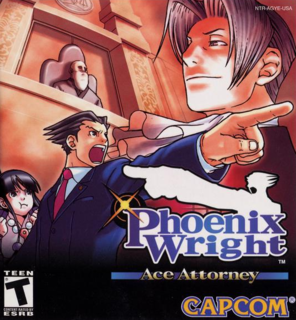Despite being mainly text-based, Phoenix Wright benefits from strong writing and finely tuned controls.
This game has you playing as Phoenix Wright, who at the start of this game is a young rookie defense attorney under the guide of his mentor Mia Fey. In each of the four cases in the game, (as well as an extra case added for the American ports) Phoenix must defend his clients who have been wrongly accused of murder. In order to do that, Phoenix must both go out into the field to find evidence to help him in the case and successfully cross-examine witnesses in court in order to reveal the truths behind these murders, some of which become connected to corrupt officials and past cases never fully solved.
There are two main things you do in the game. As mentioned earlier, you must both investigate crime scenes in order to find evidence and ultimately use that evidence to help Phoenix in court. Out in the field, you are given four options. You can talk to someone at the current location you are at at that moment, present an item to that person, examine a crime scene, or move to a different area. When you talk with someone, you are given a bunch of questions related to the case. Sometimes you won't be able to get the full truth from somebody unless you present a certain item. When you are examining a crime scene, you use a small crosshair to find things with. You move it either by using the control pad or the DS stylus.
When you are not in the field, you are in court listening to testimonies made by witnesses. As a defense attorney, it is your job to cross-examine their testimonies to find faults (contradictions) within them. You can do this in two ways. You can either press a certain statement in the testimony further in order to get more info on it or present a piece of evidence which would prove something false in that statement. If you make a mistake, part of your 'health' (which is represented by five exclamation points) is taken away by a penalty from the judge. Make 5 mistakes and you lose the case.
As I mentioned, a fifth case was added for the American ports of this game. This case introduces two new gameplay features to utilize the DS' own features for assistance in investigating crime scenes through scientific means with the help of two tools. The first, luminol spray, allows you to see blood that would be undetectable at first through the naked eye. To use it, simply tap the spot where you think blood is a few times to reveal it. The second tool, aluminum powder, is used to find fingerprints. First, you select a finger from a sample then 'cover' the touch screen with the powder and blow into the microphone to uncover the fingerprint. This case also allows you to view evidence in 3-D allowing you to find clues that you normally wouldn't see in 2-D. The DS also utilizes the microphone to allow you to speak in court by saying 'Hold It' to press a statement, 'Objection' when you, well, object to something, and 'Take That' when you're presenting evidence to prove contradictions. If you don't want to do that (but really, why wouldn't you?), you can just press the 'Present' and 'Press' buttons to do the job for you. The microphone isn't required anyway until the fifth case, although it is fun to use and yell 'objection'.
The main thing that benefits this game in the long run is its writing. This is really smart writing which never results in the game getting boring at any time. Aside from that, the characters are interesting and well developed, there is some smart and funny humor throughout the entire game, and the court trials can get very intense at times. This game also benefits from how long it will probably take you to complete the game. I'm certain you won't beat it in one sitting because while there are only five cases in this game, only one is structured differently from the other four. That is the first case, which never leaves the courtroom. You don't do investigation work until the second case and every case after that first one goes on for around three chronological days. Obviously there isn't much to the gameplay but it works for this type of game. The controls worked fine and pretty much utilized all of the features that the DS had to offer from the microphone to the touch screen. That's mainly in part due to the added case, which provided a different way of looking at crime scenes that the previous cases never did. It's hard to imagine how it all came together for the original GBA version now seeing that you would probably have to pause the game or something like that to view the court record or to navigate through investigations.
I can't say I had much problems with the game. If I did have something to note about the game, it would probably be something that just bugged me. But I really can't say anything bad about the game. I will warn you people that yes the dialogue in the game is completely text-based so if you don't like having to keep pressing the A button to scroll through the dialogue, this game isn't for you. Even though I say that, I highly recommend this game. Yes the frequent scrolling through text might get boring sometimes but this game makes up for it with its clever writing and interesting cases to solve. Aside from that, it will keep you playing for a long time seeing how long later cases get.

